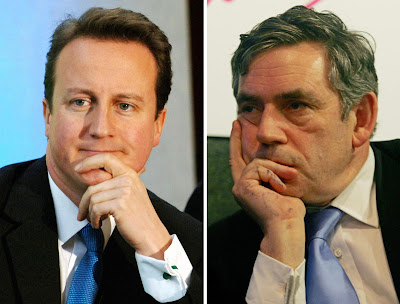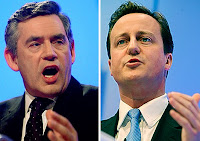
He has ducked and dived and dithered and doubted for years.
But today Gordon Brown – our unelected Prime Minister – named the day and prepares to face the electorate. He is asking for his first mandate, which he hopes will be an historic fourth term for Labour, notwithstanding the deepest recession for 60 years and a potentially mutinous public sector.
 And he does so at a time when the polls are all over the place. An ICM survey for The Guardian indicates the Conservative lead has dropped to just four points, with the Conservatives on 37%, Labour on 33% and the Lib Dems on 21%. That is certain hung parliament territory. However a YouGov poll in The Sun and another by Opinium for The Daily Express suggest the Conservatives have opened up an impressive 10% lead - the margin David Cameron is likely to need in order to win an outright majority on 6th May. The Sun has the Conservatives on 41%, Labour on 31% and the Lib Dems on 18%. The Express says the split is 39%-29%-17%.
And he does so at a time when the polls are all over the place. An ICM survey for The Guardian indicates the Conservative lead has dropped to just four points, with the Conservatives on 37%, Labour on 33% and the Lib Dems on 21%. That is certain hung parliament territory. However a YouGov poll in The Sun and another by Opinium for The Daily Express suggest the Conservatives have opened up an impressive 10% lead - the margin David Cameron is likely to need in order to win an outright majority on 6th May. The Sun has the Conservatives on 41%, Labour on 31% and the Lib Dems on 18%. The Express says the split is 39%-29%-17%.This is a two-horse race: there are only two candidates for the top job; two options to choose from. For the sake of country, community, family and personal sanity, there can be only one outcome to this General Election: the Conservative Party must win it and David Cameron must become Prime Minister to end 13 years of Labour rule.
 It has been a traumatic time – the third-longest ‘wilderness’ period in the party’s history. Not quite as fraught as the Corn Laws schism, but every bit as demoralising and depressing. As the Queen is asked to dissolve Parliament, even she might dare to hope that we are now in the final weeks of New Labour, and that ‘renewal’ and ‘recovery’ might come from a Conservative government which promises to be the most transformational in a generation.
It has been a traumatic time – the third-longest ‘wilderness’ period in the party’s history. Not quite as fraught as the Corn Laws schism, but every bit as demoralising and depressing. As the Queen is asked to dissolve Parliament, even she might dare to hope that we are now in the final weeks of New Labour, and that ‘renewal’ and ‘recovery’ might come from a Conservative government which promises to be the most transformational in a generation. It is, of course, by no means certain. There is every possibility that the nation might awake on 7th May to face five more years of Gordon Brown. But, for the first time since 1997, the country is having an election in which the outcome is not pre-ordained: it is politically exhilarating because it is the most fiercely contested election campaign for a generation and the result is genuinely uncertain. It is the most eagerly awaited political showdown (bar Boris defeating Ken Livingstone) since Tony Blair swept away John Major and 18 years of Conservative rule, and without question the most closely-fought election since John Major defied the polls and defeated Neil Kinnock in 1992.
It is, of course, by no means certain. There is every possibility that the nation might awake on 7th May to face five more years of Gordon Brown. But, for the first time since 1997, the country is having an election in which the outcome is not pre-ordained: it is politically exhilarating because it is the most fiercely contested election campaign for a generation and the result is genuinely uncertain. It is the most eagerly awaited political showdown (bar Boris defeating Ken Livingstone) since Tony Blair swept away John Major and 18 years of Conservative rule, and without question the most closely-fought election since John Major defied the polls and defeated Neil Kinnock in 1992. And with three 90-minute ‘presidential’ television debates to get through, anything could happen.
Bar Nick Clegg becoming prime minister.
The battle lines:
 Gordon Brown’s election pitch is about ‘the road to recovery’, and a Tory government will put us well and truly ‘back to the road to recession’. We face ‘three big challenges’ – ‘securing the recovery, protecting front-line services whilst halving the deficit, and renewing politics’.
Gordon Brown’s election pitch is about ‘the road to recovery’, and a Tory government will put us well and truly ‘back to the road to recession’. We face ‘three big challenges’ – ‘securing the recovery, protecting front-line services whilst halving the deficit, and renewing politics’.Recovery? Renewing politics?
He must think we have the brains of an amoeba.
David Cameron election pitch is concerned with ‘the Great Ignored’. He explains: "We're fighting this election for the Great Ignored - young, old, rich, poor, black, white, gay, straight. They start businesses, operate factories, teach our children, clean the streets, grow our food and keep us healthy - keep us safe. They work hard, pay their taxes, obey the law."
 Pity he didn’t think to include the believer / non-believer dichotomy.
Pity he didn’t think to include the believer / non-believer dichotomy.They also start businesses, operate factories, teach our children, clean the streets, grow our food, keep us healthy, keep us safe, work hard, pay their taxes and obey the law.
They also form ‘the moral conscience of the nation’.
 And there are one or two more believers than there are gays.
And there are one or two more believers than there are gays.And they too have a vote.
Nick Clegg’s election pitch is –
O, who cares?
David Cameron says the ‘Great Ignored’ are ‘good, decent people – they're the people of Britain and they just want a reason to believe that anything is still possible in our country. This election is about giving them that reason, giving them that hope’.
And that hope is Mr Cameron’s moral imperative, for he promises to govern righteously – or at least more righteously – and to administer justice, liberty, equality and fraternity. And the genealogy which shaped the British understanding of these concepts is undeniably Christian and particularly Protestant. Indeed, such terms are inexplicable and incomprehensible without reference to the religious traditions that fashioned them.
 The Conservative Party’s focus on the ‘broken society’ is reminiscent of that pursued by the party under some of its previous leaders – in particular Benjamin Disraeli, Stanley Baldwin, Harold Macmillan and Margaret Thatcher. And it may be observed that the impetus for social reform has stemmed, at least in part, from the professed Christian faith of these leaders. With David Cameron producing a political manifesto designed to address the most pressing issues of the day, such as family breakdown, drug abuse, inner-city decay and the provision of health and education to the poorest (his ‘social justice’ agenda), it may be posited that we arrive at the practical outworking of theological wisdom. His challenge will be to articulate the traditional Tory benign paternalism for order, justice and peace in the modern era, while preserving the ‘rights’ and ‘liberties’ which have accrued since his party was last in power, in particular those which emanate from the continental religio-political traditions of the European Union. The task of preserving such liberty is, as Edmund Burke identified, ‘the peculiar duty and proper trust of a member of the House of Commons’.
The Conservative Party’s focus on the ‘broken society’ is reminiscent of that pursued by the party under some of its previous leaders – in particular Benjamin Disraeli, Stanley Baldwin, Harold Macmillan and Margaret Thatcher. And it may be observed that the impetus for social reform has stemmed, at least in part, from the professed Christian faith of these leaders. With David Cameron producing a political manifesto designed to address the most pressing issues of the day, such as family breakdown, drug abuse, inner-city decay and the provision of health and education to the poorest (his ‘social justice’ agenda), it may be posited that we arrive at the practical outworking of theological wisdom. His challenge will be to articulate the traditional Tory benign paternalism for order, justice and peace in the modern era, while preserving the ‘rights’ and ‘liberties’ which have accrued since his party was last in power, in particular those which emanate from the continental religio-political traditions of the European Union. The task of preserving such liberty is, as Edmund Burke identified, ‘the peculiar duty and proper trust of a member of the House of Commons’.And there is some ‘clear blue water’ between the parties, not least on Conservative plans to oppose greater EU integration; abolish inheritance tax for the poorest; recognise marriage in the tax system; reform education by offering taxpayer-funded independent schools; and give a free vote on such conscience issues as reducing the upper limit for abortion.
The Conservative Party need to gain 116 seats to win an overall majority, which is the biggest required swing since the war. If successful, he would be the youngest prime minister for two centuries and the 12th to serve under Queen Elizabeth II.
Unlike some meddling prelates, Cranmer would never presume to tell his readers and communicants how they should vote.
But if you are considering, however tentatively, giving your vote to Labour, the Liberal Democrats, UKIP, the Greens or the BNP, he beseeches you, in the bowels of Christ, think it possible you may be mistaken.